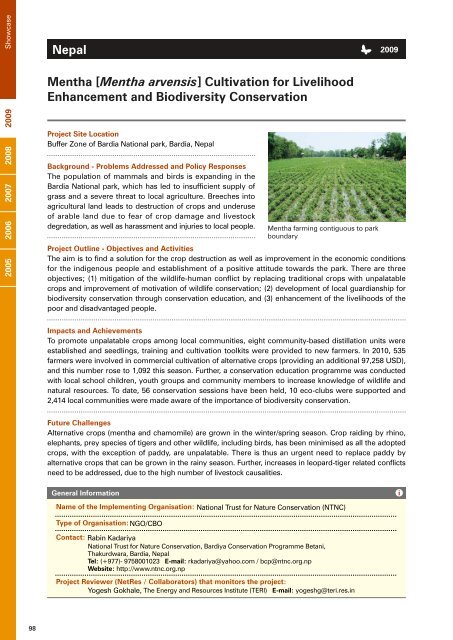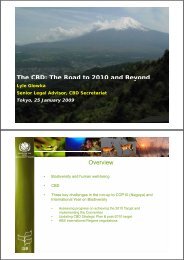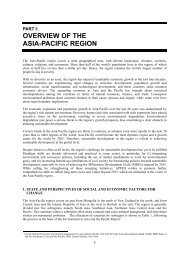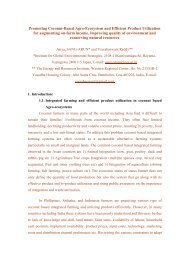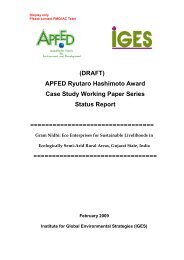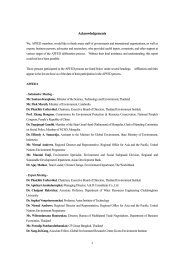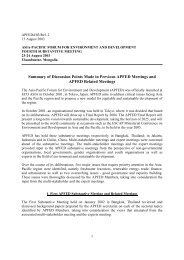APFED Booklet on Good Practices and Innovative Activities 2005 ...
APFED Booklet on Good Practices and Innovative Activities 2005 ...
APFED Booklet on Good Practices and Innovative Activities 2005 ...
You also want an ePaper? Increase the reach of your titles
YUMPU automatically turns print PDFs into web optimized ePapers that Google loves.
Showcase<br />
Nepal<br />
2009<br />
Mentha [Mentha arvensis] Cultivati<strong>on</strong> for Livelihood<br />
Enhancement <strong>and</strong> Biodiversity C<strong>on</strong>servati<strong>on</strong><br />
<strong>2005</strong> 2006 2007 2008 2009<br />
Project Site Locati<strong>on</strong><br />
Buffer Z<strong>on</strong>e of Bardia Nati<strong>on</strong>al park, Bardia, Nepal<br />
Background - Problems Addressed <strong>and</strong> Policy Resp<strong>on</strong>ses<br />
The populati<strong>on</strong> of mammals <strong>and</strong> birds is exp<strong>and</strong>ing in the<br />
Bardia Nati<strong>on</strong>al park, which has led to insufficient supply of<br />
grass <strong>and</strong> a severe threat to local agriculture. Breeches into<br />
agricultural l<strong>and</strong> leads to destructi<strong>on</strong> of crops <strong>and</strong> underuse<br />
of arable l<strong>and</strong> due to fear of crop damage <strong>and</strong> livestock<br />
degredati<strong>on</strong>, as well as harassment <strong>and</strong> injuries to local people.<br />
Mentha farming c<strong>on</strong>tiguous to park<br />
boundary<br />
Project Outline - Objectives <strong>and</strong> <strong>Activities</strong><br />
The aim is to find a soluti<strong>on</strong> for the crop destructi<strong>on</strong> as well as improvement in the ec<strong>on</strong>omic c<strong>on</strong>diti<strong>on</strong>s<br />
for the indigenous people <strong>and</strong> establishment of a positive attitude towards the park. There are three<br />
objectives; (1) mitigati<strong>on</strong> of the wildlife-human c<strong>on</strong>flict by replacing traditi<strong>on</strong>al crops with unpalatable<br />
crops <strong>and</strong> improvement of motivati<strong>on</strong> of wildlife c<strong>on</strong>servati<strong>on</strong>; (2) development of local guardianship for<br />
biodiversity c<strong>on</strong>servati<strong>on</strong> through c<strong>on</strong>servati<strong>on</strong> educati<strong>on</strong>, <strong>and</strong> (3) enhancement of the livelihoods of the<br />
poor <strong>and</strong> disadvantaged people.<br />
Impacts <strong>and</strong> Achievements<br />
To promote unpalatable crops am<strong>on</strong>g local communities, eight community-based distillati<strong>on</strong> units were<br />
established <strong>and</strong> seedlings, training <strong>and</strong> cultivati<strong>on</strong> toolkits were provided to new farmers. In 2010, 535<br />
farmers were involved in commercial cultivati<strong>on</strong> of alternative crops (providing an additi<strong>on</strong>al 97,258 USD),<br />
<strong>and</strong> this number rose to 1,092 this seas<strong>on</strong>. Further, a c<strong>on</strong>servati<strong>on</strong> educati<strong>on</strong> programme was c<strong>on</strong>ducted<br />
with local school children, youth groups <strong>and</strong> community members to increase knowledge of wildlife <strong>and</strong><br />
natural resources. To date, 56 c<strong>on</strong>servati<strong>on</strong> sessi<strong>on</strong>s have been held, 10 eco-clubs were supported <strong>and</strong><br />
2,414 local communities were made aware of the importance of biodiversity c<strong>on</strong>servati<strong>on</strong>.<br />
Future Challenges<br />
Alternative crops (mentha <strong>and</strong> chamomile) are grown in the winter/spring seas<strong>on</strong>. Crop raiding by rhino,<br />
elephants, prey species of tigers <strong>and</strong> other wildlife, including birds, has been minimised as all the adopted<br />
crops, with the excepti<strong>on</strong> of paddy, are unpalatable. There is thus an urgent need to replace paddy by<br />
alternative crops that can be grown in the rainy seas<strong>on</strong>. Further, increases in leopard-tiger related c<strong>on</strong>flicts<br />
need to be addressed, due to the high number of livestock causalities.<br />
General Informati<strong>on</strong><br />
Name of the Implementing Organisati<strong>on</strong>: Nati<strong>on</strong>al Trust for Nature C<strong>on</strong>servati<strong>on</strong> (NTNC)<br />
Type of Organisati<strong>on</strong>: NGO/CBO<br />
C<strong>on</strong>tact: Rabin Kadariya<br />
Nati<strong>on</strong>al Trust for Nature C<strong>on</strong>servati<strong>on</strong>, Bardiya C<strong>on</strong>servati<strong>on</strong> Programme Betani,<br />
Thakurdwara, Bardia, Nepal<br />
Tel: (+977)- 9758001023 E-mail: rkadariya@yahoo.com / bcp@ntnc.org.np<br />
Website: http://www.ntnc.org.np<br />
Project Reviewer (NetRes / Collaborators) that m<strong>on</strong>itors the project:<br />
Yogesh Gokhale, The Energy <strong>and</strong> Resources Institute (TERI) E-mail: yogeshg@teri.res.in<br />
98


